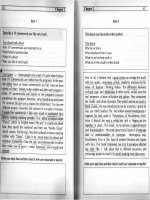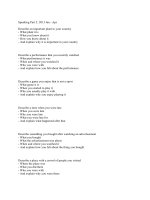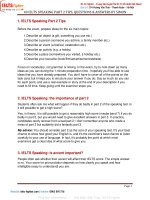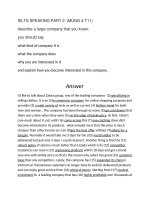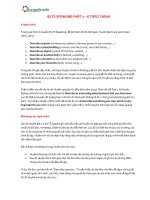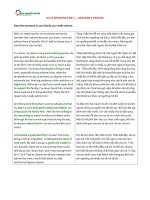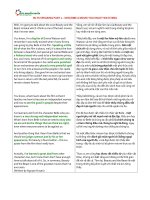IELTS+Speaking+Part+2 simon
Bạn đang xem bản rút gọn của tài liệu. Xem và tải ngay bản đầy đủ của tài liệu tại đây (285.45 KB, 9 trang )
IELTS SPEAKING PART 2 BY SIMON (IELTS-SIMON.COM)
IELTS Speaking Part 2: describe a festival
A common topic for the short presentation (IELTS Speaking Part 2) is "describe an important
festival in your country".
My advice is to look for a description of your festival on Wikipedia. Copy the best parts of the
description and make small changes if necessary. As an example, I've copied a short description
of Christmas from Wikipedia.
Describe a festival: Christmas
Christmas is an annual holiday that, in Christianity, commemorates the birth of Jesus Christ.
Popular customs of the holiday include gift-giving, music, an exchange of greeting cards, church
celebrations, a special meal, and the display of various decorations; including Christmas trees,
lights, nativity scenes, and holly. In addition, Father Christmas (known as Santa Claus in some
areas) is a popular figure in many countries, associated with the bringing of gifts for children.
Over the Christmas period, people decorate their homes and exchange gifts. In some countries,
children perform plays re-telling the events of the Nativity, or sing carols that reference the
event. Christmas, along with Easter, is the period of highest annual church attendance.
A special Christmas family meal is an important part of the celebration for many, and what is
served varies greatly from country to country. In England and countries influenced by its
traditions, a standard Christmas meal includes turkey, potatoes, vegetables, sausages and gravy,
followed by Christmas pudding, mince pies and fruit cake.
IELTS Speaking Part 2: describe a person
Describe a person you admire.
You should say:
who the person is
what he or she is like
and why you admire him or her.
Here are some ideas. I've underlined the best vocabulary.
I'm going to talk about my father because he has been a major influence in my life.
My father was always a good role model for me as I was growing up. He's hardworking, patient and understanding; he's also got a goodsense of humour and seems
to get on well with everybody. Hopefully I've inherited some of these traits.
I admire my father because I think he brought me and my brothers/sisters up well; he
was quite strict but always fair, and he has always been someone I can turn to for
Page: />
Page 1
IELTS SPEAKING PART 2 BY SIMON (IELTS-SIMON.COM)
advice. I think my father set a good example by working hard and having a positive
outlook on life. I remember that he used to leave for work early and come home quite
late, but he always made time for me and my brothers/sisters.
IELTS Speaking Part 2: describe an event
Describe a recent event that made you happy.
You should say:
when and where it was
who was involved
what happened
and explain why it made you happy.
The following description contains the kind of phrases that native speakers (like me) really use.
I've underlined the best vocabulary.
1. When and where: my friend's birthday party, last Saturday evening, we went for a meal
in an Italian restaurant.
2. Who: there were about 10 of us, he invited some close friends and work colleagues,
most of them were people I've known sinceuniversity.
3. What happened: we met at the restaurant, I gave my friend a present and a birthday
card, we ordered some food, while we ate dinnereveryone chatted, after the main
course the waiter brought out a cake and we sang 'Happy Birthday', everyone went
home quite late.
4. Why it made me happy: it was great to get together with old friends, I had some
interesting conversations, it was a good opportunity to catch up with what my
friends had been up to, it was a nice way to wind down after a hard week at work, the
food was delicious, I went homefeeling full after a fantastic meal.
IELTS Speaking: informal expressions
Yesterday I wrote about 'an event' for IELTS Speaking Part 2. Some of the expressions I used
were informal:
we chatted (talked)
to get together with (meet)
to catch up with (talk to someone you haven't seen for a while)
what my friends had been up to (had been doing)
to wind down (relax after something tiring)
The examiner would consider these phrases to be "less common vocabulary". In other words, a
few phrasal verbs or informal expressions can help you to get a high score in IELTS Speaking.
Page: />
Page 2
IELTS SPEAKING PART 2 BY SIMON (IELTS-SIMON.COM)
IELTS Speaking Part 2: describe a place
In part 2 of the speaking test, you might have to describe a place. There are several possible
questions about places. For example:
1. Describe a place you have visited.
2. Describe a historic place.
3. Describe a holiday.
4. Describe a place you would like to visit.
5. Describe somewhere you have lived or would like to live.
My advice is to prepare a description of one place that you could use to answer all of these
questions. Then search the Internet for some good vocabulary.
For example, here are some ideas I found to describe London:
Adjectives: it's exciting, busy, hectic, cosmopolitan, multicultural, unique. It's historic
but modern at the same time, it's a thriving, prosperous city, it's fashionable, lively,
fun...
Activities: London is famous for its history, culture, art, museums. Tourists go there to
see Big Ben, The Tower of London, Buckingham Palace, Trafalgar Square etc. You
can get a fantastic view of the city from the 'London Eye'. It's also famous for its
theatres and shows in the West End, its shops, restaurants and nightlife. There are
endless things to see and do.
Negatives: London is expensive, crowded, stressful, polluted. The underground system
is dirty, travel is overpriced and unpleasant. The cost of living is high (shopping,
house prices etc.), the locals are always in a hurry and can be unfriendly, there are
social problems (like you can find in most big cities).
IELTS Speaking: recorded example
Describe an interesting place you have visited.
You should say:
where it is
what you can do there
and why you think it's an interesting place.
Here's an example description of a place I've visited. I've used the vocabulary from yesterday's
lesson to describe London.
Page: />
Page 3
IELTS SPEAKING PART 2 BY SIMON (IELTS-SIMON.COM)
Listen to the recording while following the vocabulary (see yesterday's lesson). Then you could
practise your own description of London using the same vocabulary. Keep practising until you're
happy.
click here to listen
/>
IELTS Speaking Part 2: describe a foreign person
Jay sent me this interesting IELTS question:
Describe a foreign person that you like. You should say:
- where you met him/her
- why you like him/her
- and explain what you learnt from him/her
Some advice:
1. The easy choice would be to describe an English teacher. You could then talk about
your lessons and easily explain what you learnt.
2. I think it would be acceptable to describe someone you have never met. Just say "I've
never met the person I'm going to describe, but I hope to meet him/her one day".
3. If you do number 2 above, choose your hero. It's best to choose someone you know a lot
about. Give as much real information as possible. Do some Google research to get
ideas.
Finally, remember that this is a "describe a person" question. Hopefully you can use some of the
ideas from this lesson.
IELTS Speaking Part 2: 'difficult' questions
Last week I wrote about 'using what you know'. Here are some more quick examples of how you
can make a 'difficult' question much easier:
1) Describe something that you collect.
Most students panic because they don't collect anything. But this question is easier than you
think. If your hobby is listening to music or reading books, just tell the examiner that you collect
CDs or novels. You could talk about your "collection" of clothes or shoes. Everyone has a
collection of something, even if you don't call yourself a collector.
2) Describe an important decision that you made.
Easy. Just talk about the subject you chose to study or the career you decided to pursue. If you
moved to live/study in a different country, you could talk about that.
Page: />
Page 4
IELTS SPEAKING PART 2 BY SIMON (IELTS-SIMON.COM)
3) Describe an important letter you received.
Use the answer you gave for number 2 (with a few small changes). Talk about the letter you
received confirming your place on a university course, or confirming a successful job
application.
IELTS Speaking Part 2: describe a skill
Describe a practical skill that you have learnt (e.g. cooking, driving).
You should say
what the skill is
how you learnt it
why you learnt it
and how this skill has helped you.
Advice:
You need to make a quick decision, so I'd choose one of the given examples (cooking or
driving). Then try to expand on each point.
1. I'm going to talk about driving, which is a practical skill that I use almost every day.
2. I learnt to drive a car by taking lessons when I was 17. My parents paid for me to have
lessons with a professional driving instructor. I learnt by practising: first I had to get
used to steering, changing gears and using the mirrors, then we practised things like
reversing and parking. I also had to learn the highway code.
3. As a 17-year-old, I wanted to have the experience of driving a car, and I was fed up with
having to walk or take the bus or train whenever I wanted to go somewhere. I also
knew that driving would be an extremely useful skill.
4. Being able to drive has helped me in so many ways. The public transport where I live
isn't very good, so I travel to work by car most days. Having a car makes my life much
easier when it comes to things like shopping or visiting family and friends. (Last week,
for example,...)
Note:
If you need to keep speaking, give examples for point 4.
Note:
Don't ask the examiner: "Do you mean in my country or here in England?" - it doesn't matter.
Don't worry if you have a job and study at the same time - you can mention both.
IELTS Speaking Part 2: something naughty you did
Page: />
Page 5
IELTS SPEAKING PART 2 BY SIMON (IELTS-SIMON.COM)
This has been a recent question in part 2 of IELTS speaking:
Describe something naughty you did when you were a child. Say
- what you did
- when you did it
- why you did it
- and explain how your parents felt about it.
This is a difficult topic for most people, so it's a good idea to prepare for it before your test. If
you can remember a real situation, use that. If you can't remember being naughty, invent an easy
story like my example below.
Example ideas:
1. I cheated in a test at primary school by looking at the answers in my book under the
table.
2. I was about ... years old, it was a ... lesson. Give some more background about the
lesson, the test, the teacher etc.
3. I hadn't studied for the test, I didn't want to fail and have to retake the test at lunchtime.
Give reasons why you didn't have time to study.
4. The teacher caught me and told my parents. Explain their feelings: disappointed, angry,
embarrassed. Explain the punishment e.g. they 'grounded' me for a week (informal
expression, meaning 'they didn't allow me to go out or see friends').
Students' Questions: describe a newspaper
A few people have asked me for advice about this IELTS speaking question:
Describe a newspaper or magazine that you like to read.
Here are some quick tips:
Newspaper
If you read a particular newspaper every day, choose that. Explain why you like that newspaper
more than others. Say what type of stories you usually read (politics, education, science, sport
etc.) and give an example of a recent article that you read. Explain why it's important for you to
read the paper e.g. to keep up-to-date with world events, or because you find it interesting or
mentally stimulating.
Magazine
If you don't read a newspaper, tell the examiner that you read a magazine (even if you don't).
Choose/invent a magazine about one of your hobbies or interests. This allows you to talk about
something you know about. It might be a good idea to have a look at the magazines in your local
shop; choose one that interests you, buy it, and use it to prepare some ideas.
Page: />
Page 6
IELTS SPEAKING PART 2 BY SIMON (IELTS-SIMON.COM)
IELTS Speaking Part 2: describe a building
Describe a modern building. You should say:
where it is
what it is used for
and why you like/dislike it.
Here's my example description of a building in Manchester:
1. I'm going to describe a modern building in Manchester. It's called the Beetham Tower,
and it's the tallest building in the city, with about 50 floors.
2. Although it's called the Beetham Tower, most people know this building as the Hilton
Hotel. In fact, the bottom half of the tower is the hotel and the top half is apartments.
The apartments are expensive because the location and views make them very
desirable.
3. I'm not sure if I like the design of the building, it's just a huge glass tower, but it
definitely stands out. It has become a famous landmark in the city. You can see it as
you approach Manchester, and it's an easy place to meet people because it's so
distinctive and easy to find. The most interesting thing about the Beetham Tower is that
there is a bar/restaurant on the 23rd floor which has spectacular views of the city; it's
definitely the best vantage point in Manchester because there are no walls, only huge
windows, so you can look out over the city in any direction. I'd recommend anyone
who visits Manchester to go there and experience the view.
IELTS Speaking: 'band 9' example
Here's my 'band 9' example for yesterday's IELTS speaking question:
click here to listen
These are some of the best words and phrases that I used. Look them up in a dictionary if you're
not sure what they mean:
Page: />
Page 7
IELTS SPEAKING PART 2 BY SIMON (IELTS-SIMON.COM)
desirable location
it stands out
a famous landmark
it's distinctive
spectacular views
the best vantage point
/>
IELTS Speaking Part 2: choosing a 'strong topic'
Most people are good at talking about their studies, work, hobbies, health etc. I call these "strong
topics".
For the question below you can choose any topic you want, so choose something that you find
easy to talk about.
Describe something that was recently reported in the news.
You should say:
what happened
who was involved
and why you found this news interesting
Example topic choices for the question above:
1. My strong topic could be "education", so I'd say that I read a news article about
universities using the Internet. Click here to see a recent article about this topic.
2. If you like football, you could talk about the news that Barcelona won the Champions
League.
3. If you have studied the "health" topic for IELTS writing, you could talk about schools
banning junk food. I did a quick search and found this article about schools in Dubai.
IELTS Speaking Part 2: describe a lesson
Speak for 2 minutes about the following topic.
Describe an interesting lesson that you attended.
You should say
where you attended this lesson
what it was about
Page: />
Page 8
IELTS SPEAKING PART 2 BY SIMON (IELTS-SIMON.COM)
and why you found it interesting
Here are some ideas for a description of a science lesson:
1. I'm going to talk about an interesting science lesson that I attended at secondary school
when I was 14 or 15 years old.
2. It was quite a long time ago, so I can't remember every detail, but the lesson was about
respiration. We learnt about how the lungs work, how we breathe, and how oxygen
passes into the blood. The science teacher also talked to us about the effects of
smoking on the lungs.
3. I found this lesson interesting because my science teacher, Dr. Smith, always introduced
new topics by showing us a video. We watched a short film about how respiration
works, and I found this much easier to understand than a science textbook. The film
showed diagrams of the lungs to explain the breathing process. Later in the lesson we
saw real photos of healthy lungs and lungs that had been damaged as a result of
smoking; they had turned black. I think the image of a smoker's lungs is the reason
why I remember this lesson.
Page: />
Page 9

